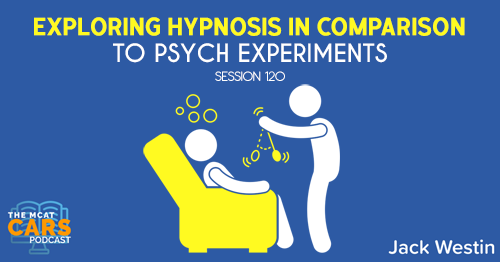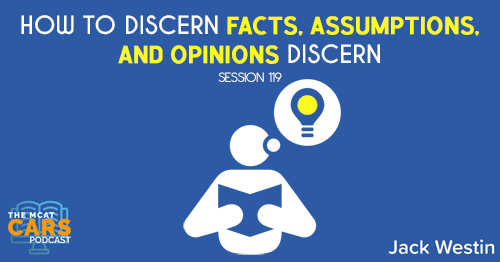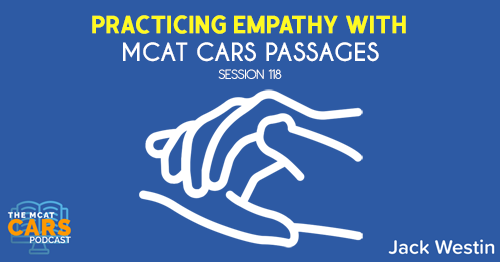Apple Podcasts | Google Podcasts

Session 59
This passage features different points of view about the nature of the U.S. president’s power, and whether it resembles a monarch’s authority.
Jack Westin joins us once again for a deep dive into another passage so you can better prepare for your MCAT CARS section.
[03:15] About the Passage
Today’s passage is going to be very similar to what you’re going to see on the actual test. It’s going to present arguments and topics. The nature of the discussion is very similar.
This passage does a great job of explaining the author’s position and the angle. Whenever the author says something, there’s probably an argument and has a specific angle.
'Notice the importance of reading the entire passage.'Click To TweetListen to this podcast episode with the player above, or keep reading for the highlights and takeaway points.
Link to article:
https://www.theatlantic.com/ideas/archive/2019/06/executive-power-doesnt-mean-much/590461/
Is the president a king? The question may sound absurd, but you’d be surprised: A great many lawyers, politicians, judges, and policy experts think the U.S. Constitution builds from exactly that starting point. Their argument relies on the first sentence of Article II, which gives the president “the executive power.” That phrase, they claim, was originally understood as a generic reference to monarchical authority. This means, they say, that the American president must have been given all the prerogatives of a British king, except where the Constitution specifies otherwise. The foreign-relations scholar Philip Trimble states their conclusion plainly: “Unless the [Article II] Vesting Clause is meaningless, it incorporates the unallocated parts of Royal Prerogative.”
The repercussions of this claim ripple across the face of constitutional law. During Senate hearings on legislating an end to the Iraq War, Brad Berenson, who had served as one of President George W. Bush’s top lawyers, told the Senate that the executive-power clause conveys “a vast reserve of implied authority to do whatever may be necessary in executing the laws and governing the nation.” When the Bush administration wanted to defy statutory restrictions on dragnet surveillance, the Justice Department relied on the clause in advising that Congress “cannot restrict the President’s ability to engage in warrantless searches that protect the national security.” And Justice Clarence Thomas put the clause front and center in concluding that “those who ratified the Constitution understood the ‘executive Power’ vested by Article II to include those foreign affairs powers not otherwise allocated in the Constitution.”
These aren’t selective examples. Pick a random recent controversy about presidential power, and you’re almost certain to find the president-as-king claim woven into the debates. During the George W. Bush administration, the argument was used to defend the torture of prisoners, the evasion of habeas corpus, and the claim of authority to invade Afghanistan and Iraq without congressional authorization. During the Obama administration, the argument surfaced in debates about the administration’s defiance of a statute recognizing Jerusalem as the capital of Israel and about the use of force against Libya. And supporters of the Trump administration have supercharged the claim, advocating a breathtaking theory of indefeasible imperial prerogative in areas ranging from the Russia investigation and workaday congressional oversight to immigration law and the bombing of Syria.
After years of research into an enormous array of colonial, revolutionary, and founding-era sources, I’m here to tell you that—as a historical matter—this president-as-king claim is utterly and totally wrong. I’ve reviewed more than a thousand publications from the 17th and 18th centuries for each instance of the word root exec-, and have read most of those texts from cover to cover with the topic of presidential power squarely in mind. I’ve read every discussion of executive power and presidential authority that appears in the gigantic compilation of archival materials known as the Documentary History of the Ratification of the United States Constitution. And with the help of a team of research assistants, I’m most of the way through flyspecking the full records of the Continental Congress—including committee reports, floor debates, and delegate correspondence—with the same question in mind.
All this work has left me with both the confidence to share this conclusion and the sense of obligation to do so as bluntly as possible. It’s just not a close call: The historical record categorically refutes the idea that the American revolutionaries gave their new president an unspecified array of royal prerogatives. To the contrary, the presidency that leaps off the pages of the Founders’ debates, diaries, speeches, letters, poems, and essays was an instrument of the law of the land, subject to the law of the land, and both morally and legally obliged to obey the law of the land.
[04:45] Paragraph 1, Sentence 1
Is the president a king?
Jack says:
The author is setting up the whole article with one sentence as a question, to begin with. They’re probably going to discuss this a lot and they want you to start thinking about it. So they question it.
[05:14] Paragraph 1, Sentence 2
The question may sound absurd, but you’d be surprised: A great many lawyers, politicians, judges, and policy experts think the U.S. Constitution builds from exactly that starting point.
Jack says:
The author is pointing out that they sound crazy but it looks like it’s a debate. This is one side of the argument.
'What if you read this first sentence and you're not hooked? And what if you try really hard and you're still not hooked? Keep going!'Click To Tweet[06:33] Paragraph 1, Sentence 3
Their argument relies on the first sentence of Article II, which gives the president “the executive power.”
Jack says:
You don’t need to know what exactly is Article II, but the author is saying they’re using Article II to explain their point of view that the president is like a king.
This sentence quoted “executive power” because it’s from the article. But it’s also another way of showing you that maybe the president is a king. There is power associated to this terminology.
[07:35] Paragraph 1, Sentence 4
That phrase, they claim, was originally understood as a generic reference to monarchical authority.
Jack says:
This is an opinion because of the phrase “understood as.” This is what the people who believe the president is a king would want you to think. It comes from this monarchial past. But we don’t really know. This is just their point of view. So don’t get fooled into thinking that this is a fact because it’s not a fact.
'Really look out for the subtle words that can tell you whether it's a fact or an argument.'Click To TweetWhen you’re reading, have a sense of skepticism because everything the author is telling you is a point of view. And it could be right or wrong. It’s not up to us to decide that though. We just have to listen to the different points of view.
Keep in mind that reading the points of view is key. You have to know who said what and what they believe. It doesn’t necessarily mean you have to believe it.
'You have to know what was said and who said it.'Click To Tweet[09:26] Paragraph 1, Sentence 5
This means, they say, that the American president must have been given all the prerogatives of a British king, except where the Constitution specifies otherwise.
Jack says:
Notice it says “this means, they say” so this is from their point of view. Whether’s it’s the author’s point of view, we don’t know yet.
'Just because the author brings it up doesn't mean it's the author's point of view.'Click To TweetYou would know if it’s the author’s point of view if they just flat out say it as if it’s their opinion. If they say that in a very direct manner, then you know it’s their opinion.
What makes it really clear is if they say they believe or they say it’s their opinion. That being said, don’t take it for a fact because it could still be an argument in this case.
[11:13] Paragraph 1, Sentence 6
The foreign-relations scholar Philip Trimble states their conclusion plainly: “Unless the [Article II] Vesting Clause is meaningless, it incorporates the unallocated parts of Royal Prerogative.”
Jack says:
The author is bringing in Tremble who believes that the president is king. It’s showing us that they believe in this point of view.
This paragraph is trying to point out that the constitution or the articles come from a place where there is a monarchical kind of situation.
[12:30] Paragraph 2, Sentence 1
The repercussions of this claim ripple across the face of constitutional law.
Jack says:
Repercussion means there is some effect. It may not necessarily be bad. It means that thinking this way leads to some indirect outcome. But if they use it in this way, it’s probably bad. They even say “in the face of constitutional law” so it’s probably going against laws.
[13:45] Paragraph 2, Sentence 2
During Senate hearings on legislating an end to the Iraq War, Brad Berenson, who had served as one of President George W. Bush’s top lawyers, told the Senate that the executive-power clause conveys “a vast reserve of implied authority to do whatever may be necessary in executing the laws and governing the nation.”
Jack says:
This clause is showing that if they believe the king as president, they can do a lot of things like bypass or challenge whatever goes against the constitutional law. In this case, they’re giving you an example of the Iraq war.
[15:00] Paragraph 2, Sentence 3
When the Bush administration wanted to defy statutory restrictions on dragnet surveillance, the Justice Department relied on the clause in advising that Congress “cannot restrict the President’s ability to engage in warrantless searches that protect the national security.”
Jack says:
It’s another example of the president’s authority.
[15:25] Paragraph 2, Sentence 4
And Justice Clarence Thomas put the clause front and center in concluding that “those who ratified the Constitution understood the ‘executive Power’ vested by Article II to include those foreign affairs powers not otherwise allocated in the Constitution.”
Jack says:
The author is bringing in this judge so they’re really supporting this idea that maybe the president is a king. The author has painted this picture that this question on whether the president is a king is based on foreign affairs.
That’s the angle of the argument. It’s not just any kind of affair. So far, they’ve given us examples of foreign affairs like the Iraq war and dragnet surveillance (whatever this is).
Even Justice Clarence Thomas said “foreign affairs powers.” Keep this in mind when you’re reading this. It’s not necessary to write down or highlight this. But understand that the argument it’s taking is from the point of view of foreign affairs.
'What happens when you read a sentence that you don't fully get is you start making assumptions.'Click To TweetIt’s not bad to make assumptions because they can guide you with your predictions. And your predictions usually help you as there are trends that you notice before. So you use that to understand the information.
On the other hand, that could be disastrous. If you don’t fully understand the first sentence or you commit to what you originally thought, you may not interpret the rest of this paragraph properly. It’s very important to acknowledge or be honest about what you understand and what you don’t really understand. Hence, you need to be able to adapt and listen to the author.
[19:32] Paragraph 3, Sentence 1
These aren’t selective examples.
Jack says:
It doesn’t seem that the author is going towards this track since we spent two paragraphs on it. Obviously, the author cares about it.
[20:00] Paragraph 3, Sentence 2
Pick a random recent controversy about presidential power, and you’re almost certain to find the president-as-king claim woven into the debates.
Jack says:
The author is saying this is everywhere.
[20:16] Paragraph 3, Sentence 3
During the George W. Bush administration, the argument was used to defend the torture of prisoners, the evasion of habeas corpus, and the claim of authority to invade Afghanistan and Iraq without congressional authorization.
Jack says:
These are still all foreign affairs. So we’re given more examples of the same stuff.
[20:41] Paragraph 3, Sentence 4
During the Obama administration, the argument surfaced in debates about the administration’s defiance of a statute recognizing Jerusalem as the capital of Israel and about the use of force against Libya.
Jack says:
More examples of foreign affairs.
[20:58] Paragraph 3, Sentence 5
And supporters of the Trump administration have supercharged the claim, advocating a breathtaking theory of indefeasible imperial prerogative in areas ranging from the Russia investigation and workaday congressional oversight to immigration law and the bombing of Syria.
Jack says:
We’re still given more examples. The paragraph is basically saying that any controversy about presidential power stems from the “president as a king” claim.
[21:57] Paragraph 4, Sentence 1
After years of research into an enormous array of colonial, revolutionary, and founding-era sources, I’m here to tell you that—as a historical matter—this president-as-king claim is utterly and totally wrong.
Jack says:
The author is literally telling you his/her point of view telling you that this claim is all wrong.
The reason you need to read the entire passage is that we don’t know the author’s position until we read the whole thing. Then you won’t miss out on the important ideas or opinions that they may ask about.
'If you just read the first two or three paragraphs, you're screwed!'Click To Tweet[23:27] Paragraph 4, Sentence 2
I’ve reviewed more than a thousand publications from the 17th and 18th centuries for each instance of the word root exec-, and have read most of those texts from cover to cover with the topic of presidential power squarely in mind.
Jack says:
The author is now trying to set up his/her argument. They’re now establishing themselves as the authority.
[24:18] Paragraph 4, Sentence 3
I’ve read every discussion of executive power and presidential authority that appears in the gigantic compilation of archival materials known as the Documentary History of the Ratification of the United States Constitution.
Jack says:
We’re given more evidence of the author’s expertise.
[24:55] Paragraph 4, Sentence 4
And with the help of a team of research assistants, I’m most of the way through flyspecking the full records of the Continental Congress—including committee reports, floor debates, and delegate correspondence—with the same question in mind.
Jack says:
The paragraph ends with the author giving more examples. And we now know that it’s wrong, coming from the author’s position who’s trying to support it through research they did.
[25:40] Paragraph 5, Sentence 1
All this work has left me with both the confidence to share this conclusion and the sense of obligation to do so as bluntly as possible.
Jack says:
The author is saying he/she needs to tell us about what he found because it’s just all wrong.
[25:54] Paragraph 5, Sentence 2
It’s just not a close call: The historical record categorically refutes the idea that the American revolutionaries gave their new president an unspecified array of royal prerogatives.
Jack says:
The author says that the president is not a king and it was never meant to be set up that way. They’re interpreting the American revolutionary’s point of view in a totally different way.
[26:33] Paragraph 5, Sentence 3
To the contrary, the presidency that leaps off the pages of the Founders’ debates, diaries, speeches, letters, poems, and essays was an instrument of the law of the land, subject to the law of the land, and both morally and legally obliged to obey the law of the land.
Jack says:
The author is interpreting everything they’ve read and why the president is not a king.
[27:27] The Big Picture
The main idea is the author’s biggest point of view where the idea that the “president is a king” is wrong. Specifically, the president is subject to the law as what the last paragraph says.
[28:10] Final Thoughts
This passage shows you how important it is to read the whole thing. It also shows you how arguments work. Just be able to understand the angle and how they bring up stuff.
'This is a great article that captures the essence of CARS.'Click To TweetLinks:
Link to article:
https://www.theatlantic.com/ideas/archive/2019/06/executive-power-doesnt-mean-much/590461/
SEARCH SITE
SEARCH SITE
LISTEN FOR FREE











